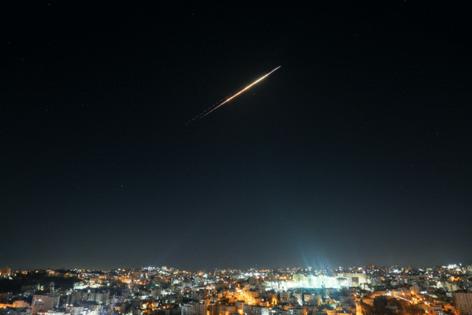Israel's war on Iran intensifies as Trump weighs joining attacks
Published in News & Features
Israel struck more of Iran’s nuclear sites and warned its attacks could bring down Tehran’s leadership as both sides await U.S. President Donald Trump’s decision on whether to join the offensive on the Islamic Republic.
Prime Minister Benjamin Netanyahu said Thursday that while the military’s objective remains the destruction of Iran’s nuclear and ballistic missile capabilities, “we may create the conditions” to help change the government.
In answer to whether that meant targeting Supreme Leader Ayatollah Ali Khamenei, Netanyahu said “no one is immune.” Defense Minister Israel Katz earlier mentioned Khamenei by name, saying he would “be held accountable” after Iran’s missiles struck an Israeli hospital with the two countries continuing to exchange fire.
Senior U.S. officials are preparing for the possibility of a strike on Iran in coming days, people familiar with the matter said, with some pointing to potential plans for a weekend strike. Top leaders at a handful of federal agencies have begun getting ready for an attack, one person said.
Trump has for days publicly mused about joining Israel’s strikes on Iran, a move that would escalate the conflict in the oil-rich Middle East.
With no indication of a pause in hostilities, other international governments stepped up efforts to rein in the conflict. U.K. Prime Minister Keir Starmer called on Trump to keep the door open to resuming talks over Iran’s nuclear program, a sign of his concern about possible American military action. Anwar Gargash, diplomatic adviser to United Arab Emirates President Mohamed bin Zayed Al Nahyan, also called for an end to hostilities and a return to dialog.
Iranian Foreign Minister Abbas Araghchi said Wednesday his country remained “committed to diplomacy” and has never sought and would never seek nuclear weapons. Khamenei said the same day he won’t surrender.
A missile from Iran on Thursday struck an Israeli hospital for the first time since the war started, a reminder of the risks to civilians in both countries. Israel’s Health Ministry said there were only a number of light injuries in the incident at Soroka Medical Center in the south of the country, as the missile landed in a department that had been evacuated just hours earlier.
Israel’s own campaign shows no sign of letting up, with jets striking dozens of military targets in Iran overnight, including an inactive nuclear reactor in the area of Arak. The country will escalate attacks on Iranian strategic and government targets, Katz said.
Arak has long been the focus of international scrutiny due to its potential role in plutonium production, which could be used in future nuclear-weapon production if reprocessing capabilities were developed. The Arak-Khondab region area, situated in central Iran, is itself strategically significant as it is home to some of the country’s most critical atomic infrastructure.
European stocks and U.S. futures edged lower on geopolitical uncertainty and concerns about the inflationary impact of higher crude prices. Brent rose 1.6%, trading close to $78 per barrel. Cash trading in U.S. stocks and Treasuries is closed for the Juneteenth holiday.
Araghchi is set to meet foreign ministers from the U.K., France, and Germany on Friday in Geneva to discuss the Islamic Republic’s nuclear program and the war with Israel, according to a statement from his office. The European Union’s top diplomat, Kaja Kallas, will be present.
A day later, the Iranian minister is expected to attend the Organization of Islamic Cooperation meeting in Istanbul, Turkish news channel NTV reported, citing diplomatic sources it didn’t identify. A special session on the war between Israel and Iran is planned.
Trump told reporters at the White House Wednesday he has “ideas as to what to do” and that he prefers to make the “final decision one second before it’s due” because the situation is fluid.
A few hours earlier, Trump had said, “I may do it. I may not do it,” when asked if he was moving closer to attacking Iran.
A White House official said that all options remain on the table.
Change of tone
The president’s openness to war is a reversal from his public remarks a week ago, when Trump was urging diplomatic talks to reach a nuclear disarmament deal with Iran.
Waiting a few days to strike gives Iranian leaders additional runway to demonstrate to Trump they are willing to give up some uranium enrichment capabilities to deter a U.S. attack.
International Atomic Energy Association inspectors “have not seen” any structured effort by Iran to produce nuclear weapons, but “no country in the world is enriching uranium at this level,” the United Nations watchdog’s director general, Rafael Mariano Grossi, told Bloomberg Television on Wednesday.
Since Israel first attacked Iran on Friday, hundreds of people have been killed. At least 224 Iranians have died, mostly civilians, according to Iran’s health ministry. Israel says 400 ballistic missiles and hundreds of drones fired by Iran killed 24 people and injured more than 800, according to the Israeli emergency services.
----------
—With assistance from Ellen Milligan, Dana Khraiche and Galit Altstein.
©2025 Bloomberg L.P. Visit bloomberg.com. Distributed by Tribune Content Agency, LLC.







Comments